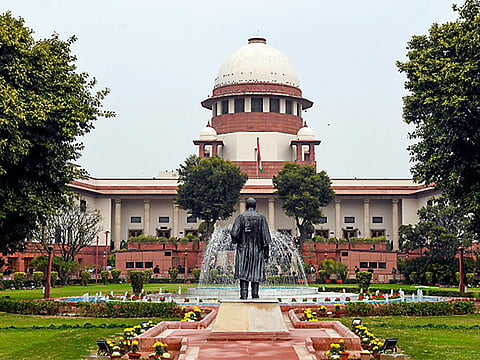

NEW DELHI: The Supreme Court on Monday in a major ruling held that the watching and even mere storage of child pornographic material is an offence under the Protection of Children from Sexual Offences Act (POCSO Act).
A three-judge bench of the top court, led by the Chief Justice of India (CJI) D Y Chandrachud and also comprising Justices J B Pardiwala and Manoj Misra overturned a Madras High Court ruling in this regard.
While setting aside the Madras HC order which held that merely downloading and or watching child pornography on one's electronic device did not constitute an offence under the POCSO and the IT Act, the apex court said, "The Madras High Court has committed error in its order, and thus we set aside HC order and we remit the matter back to the sessions court."
"To establish the offence under Section 15(3) POCSO, apart from storage of child pornographic material, it has to be shown that such storage was done to make some gain or advantage," it said.
The apex court also in the judgement suggested the Parliament to bring an ordinance to replace the term "child pornography" with "Child Sexual Exploitative and Abuse Material (CSEAM)". It issued orders and directions to all courts in India, not to use the term "child pornography" anymore in their judicial orders and verdicts.
While giving some directions and some suggestions, Justice Pardiwala, reading the verdict for the bench said that there must be intention on part of the accused to share such material.
"To constitute an offence under section 15(2) of POCSO, there must be something more to show that the actual transmission or distribution of such material, facilitation of such transmission, preparation, set up to enable transmit etc has to be there," he said.
The Supreme Court's three-judge bench, led by the CJI, had reserved its verdict on April 19.
The SC, had earlier, during one of the hearings in March this year, had termed the Madras HC order as "atrocious", and agreed to hear the plea challenging the HC ruling that has said mere downloading and watching child pornography is not an offence under the POCSO Act and IT Act.
Primarliy, the HC had, on January 11, this year, in its order quashed a criminal case against a 28-year-old man, S Harish, charged by the prosecution for illegally downloading and watching on his mobile phone some pornographic content involving children.
The HC had quashed the criminal case against Harish under the POCSO Act, 2012 and the IT Act, 2000.
The HC had granted relief to Harish on the ground that to constitute an offence under Section 67-B of IT Act, 2000, the accused person (Harish) must have published, transmitted, created material depicting children in a sexually explicit act or conduct. A careful reading of this provision does not make watching child pornography, an offence under the said Section. The HC, had, however, expressed its serious concerns over children used in pornography and watching pornography.
Challenging this judgment, the NGO, Just Right for Children Alliance, which work for the welfare of children, had knocked on the doors of the apex court, seeking a direction for setting aside the HC order and sought appropriate directions against the accused, Harish.
During the course of one of the hearings, the top court bench led by Chandrachud had observed that merely downloading or watching child porn may not be an offence but certainly, child being used in pornography will be an offence.
Harish also submitted that when this clip came to him, it was June 14, 2019, and section 8 was amended on August 16, 2019. To this, the CJI pointed out and clarified that but there has to be an intention to distribute the content, in this case he got a clip from someone.
The apex court also admitted that the receipt of the video was not violative of Section 15. But if someone continues to watch it and breach the section with an intent to distribute it, then it is a violation.
The accused, Harish, the respondent in the case, in his defence said that there was auto download in WhatsApp if you are connected over wifi.
The petitioner- NGO, Just Right for Children Alliance, had told the top court that the tip came from the home ministry to the district police, and it was scanned by a foreign organisation that tracks such internet downloads of child porn. For two years the person was watching child pornography.
After the judgement was pronounced, Bhuwan Ribhu, petitioner and Founder of Just Rights for Children Alliance in the Supreme Court NGO, talking to The New Indian Express, said that the verdict would have long-lasting and global impact on society, crime and child rights and will be etched in history.
“India, has once again, paved the way globally by laying down the framework for prevention and protection of children from this transnational and organised crime," Ribhu said.
When a person is searching for and downloading ‘child exploitation and abuse material’, they are creating the demand for the rape of our children, he said.
"This judgment also breaks away from the conventional terminology of child pornography, which is seen as an adult indulgence and creates the shift in narrative to ‘child exploitative and abuse material’, being a crime”, said Ribhu.